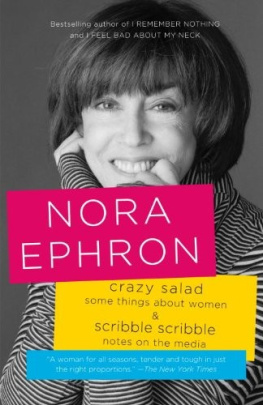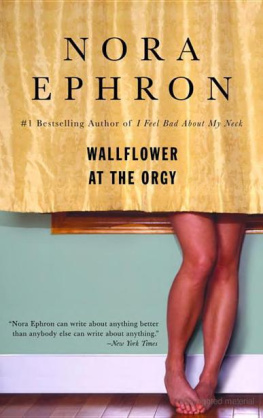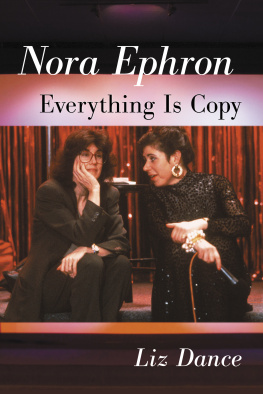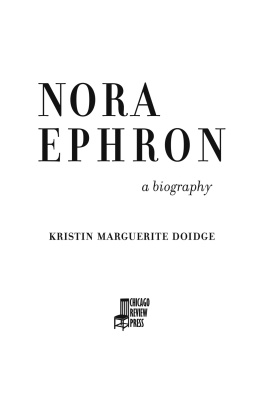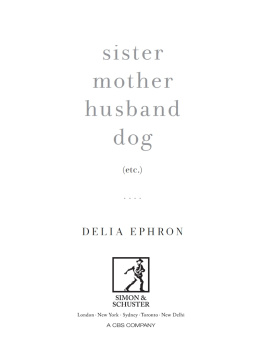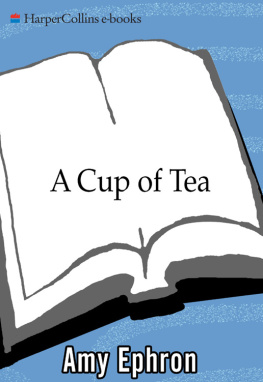Crazy Salad
Some Things About Women
Nora Ephron
Vintage Books
A Division of Random House, Inc.
New York
Copyright 1975, 1983 by Nora Ephron
All rights reserved. Published in the United States by Vintage Books, a division of Random House, Inc., New York, and in Canada by Random House of Canada Limited, Toronto. Originally published in hardcover in different form in the United States by Alfred A. Knopf, a division of Random House, Inc., New York, in 1975. Subsequently published in trade paperback by Modern Library, a division of Random House, Inc., New York, in 2000.
Vintage and colophon are registered trademarks of Random House, Inc.
The Library of Congress has cataloged the Modern Library edition as follows:
Ephron, Nora.
Crazy salad : some things about women / by Nora Ephron.1st ed.
p. cm.
1. Women. 2. FeminismUnited States.
HQ1154 . E6 201
305.420973dc21 99-086032
74025227
eISBN: 978-0-345-80473-0
www.vintagebooks.com
v3.1
CONTENTS
FromCrazy Salad
FromScribble Scribble
FromEsquire
For my sisters:
Delia, Hallie, and Amy
Its certain that fine women eat
A crazy salad with their meat
Whereby the horn of plenty is undone.
W ILLIAM B UTLER Y EATS
I NTRODUCTION
by Nora Ephron
For a while there I wrote about women. I started in 1972, when the womens movement was in a period of frenzied activity, and I stopped in 1974, when it had moved into what we liked to call a period of consolidation. I wrote about women once a month, and then put it together as Crazy Salad. The title of the collection comes from some lines in a Yeats poem: Its certain that fine women eat / a crazy salad with their meat / whereby the horn of plenty is undone. In the original edition of this book, I left the last line off. It seemed more hopeful, more playful, punchier really without that last grim image. Whereby the horn of plenty is undone. Im not sure now what instinct prompted me to want to seem so optimistic, since I can see just from rereading these pieces that I had almost no grounds for being so; Im also not sure why I wanted to absolve women from the full dose of counterproductiveness Yeats was describing, since I had spent two years reporting on women and, on some level, writing about it every month. Still, change seemed so inevitable, so inexorable. Things were bound to move along. Time marches on. That something else might turn out to be truethat the operative bromide for change where women were concerned might instead be in the plus-a-change areaseemed quite unlikely to me.
These days I find that I constantly have to remind myself that change for American women began in Seneca Falls in 1848; I have to remind myself of this since so much of what happened in the early 1970s seems undone, and so much of what ought to have happened since simply hasnt. In those days, we honestly believed for a few minutes that all it would take to change the world was the will to change it. We (women) would changeand they (men) would have to change too. Abracadabra. I remember sitting on the beach in the summer of 1972 with my first husband and drawing up a list of household duties and dividing them up again in a more equitable fashion. I had read about doing this in a womens movement pamphlet. The politics of housework, I think it was called. The personal is political, I think it said. Revolution begins at home. The author of the article about redistributing household duties said that she and her husband had drawn up a schedule, and she reprinted it in the pamphlet. On Mondays, Wednesdays and Fridays, she made the bed. On Tuesdays, Thursdays and Saturdays, he made the bed. On Sunday no one made the bed. A year later I was divorced from my first husband, and the author of that article was divorced from hers. Presumably we both ended up making our beds seven days a week. So much for revolution.
We got divorced and we got tired. Women were still being paid less than men for the same work, but never mind.
I often wonder how we could have been so simpleminded about how hard it is to bring about the least little changebut then I often wonder about a lot of things. I wonder when we are going to stop wanting it to be easyand when were going to stop whining when its not. I wonder when were going to stop wanting it both ways: demanding the options and then complaining about the difficulty of the choices; making the choice and then blaming others for it; claiming to be heroines but demanding the prerogatives of victims. I also wonder if were ever going to give up the greatest luxury we have as womenthe alibi of our sex. Obviously, I dont know the answer to any of this; but in the meantime, I continue to be drawn to the crazy salad, to the mistakes, the contradictions, the counterproductiveness, the glorious mess of it all.
Anyway, for a while there I wrote a column about women. And then I wrote a column about the presswhich was collected as Scribble Scribble. I had a chance as a columnist to use a set of muscles I had never used as a newspaper reporter or magazine writer; I wound up comfortable with the essay form and oddly grateful for the discipline it imposes. Most of the articles published here first appeared in Esquire magazine. Some of them I believe as sincerely as I did the day I finished writing them, and some are written by someone I used to be. Some of them seem datedwhich is inevitable with magazine pieces; some of them that seem dated nonetheless have a kind of quaint historical value.
Enough. Here they are.
N EW Y ORK
November, 1983
P REFACE
I began writing a column about women in Esquire magazine in 1972. The column was my idea, and I wanted to do it for a couple of specific, self-indulgent reasons and one general reason. Self-indulgent specifics first: I needed an excuse to go to my tenth reunion at Wellesley College, and I was looking for someone to pay my way to the Pillsbury Bake-Off. Beyond that, and in general, it seemed clear that American women were going through some changes; I wanted to write about them and about myself. When I began the column, the womens movement was in a period of great activity, growth, and anger; it is now in a period of consolidation. The same is true for me, and it has something to do with why it has become more and more difficult for me to write about women. Also, Im afraid, I have run out of things to say.
As I go through the articles in this book, I can think of dozens of others I could have done instead. I dont deal with lesbianism here and, except peripherally, I dont deal with motherhood. Month by month, I took what interested me most, and so I never wrote about a number of things that interested me somewhat: panty hose, tampons, comediennes, the Equal Rights Amendment, Fascinating Womanhood, Bella Abzug, The Story of O, the integration of the Little LeagueI could go on and on. The point here is simply to say that this book is not intended to be any sort of definitive history of women in the early 1970s; its just some things I wanted to write about.
1975
A F EW W ORDS A BOUT B REASTS
I have to begin with a few words about androgyny. In grammar school, in the fifth and sixth grades, we were all tyrannized by a rigid set of rules that supposedly determined whether we were boys or girls. The episode in Huckleberry Finn where Huck is disguised as a girl and gives himself away by the way he threads a needle and catches a ballthat kind of thing. We learned that the way you sat, crossed your legs, held a cigarette, and looked at your nailsthe way you did these things instinctively was absolute proof of your sex. Now obviously most children did not take this literally, but I did. I thought that just one slip, just one incorrect cross of my legs or flick of an imaginary cigarette ash would turn me from whatever I was into the other thing; that would be all it took, really. Even though I was outwardly a girl and had many of the trappings generally associated with girldoma girls name, for example, and dresses, my own telephone, an autograph bookI spent the early years of my adolescence absolutely certain that I might at any point gum it up. I did not feel at all like a girl. I was boyish. I was athletic, ambitious, outspoken, competitive, noisy, rambunctious. I had scabs on my knees and my socks slid into my loafers and I could throw a football. I wanted desperately not to be that way, not to be a mixture of both things, but instead just one, a girl, a definite indisputable girl. As soft and as pink as a nursery. And nothing would do that for me, I felt, but breasts.
Next page
